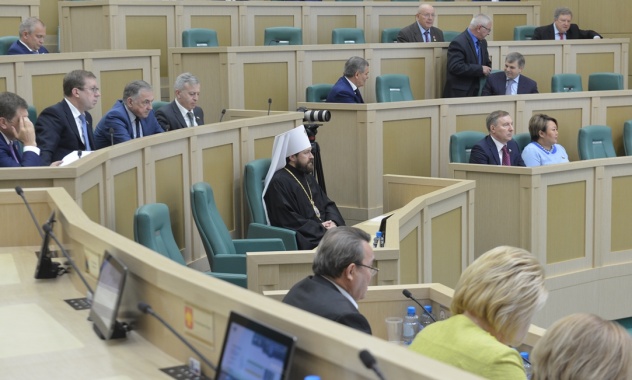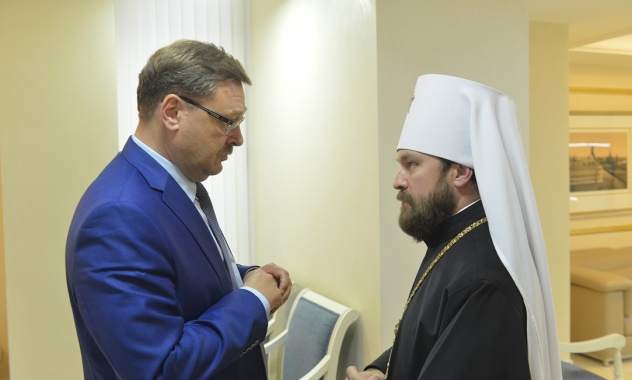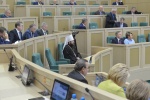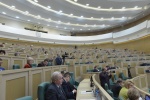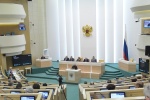Metropolitan Hilarion speaks at the Council of the Federation plenary session
May 31, 2017 – Metropolitan Hilarion of Volokolamsk, head of the Moscow Patriarchate department for external church relations and rector of the Ss Cyril and Methodius Institute of Post-Graduate Studies, spoke at the Experts’ Time section of the Council of the Federation plenary session.
His Eminence was introduced to the audience by the Council of the Federation chair, Ms. V. Matvienko who was present in the hall.
The year 2017 marks the centenary of the tragic events that took place during the two Russian revolutions – in February and October 2017. In his remarks, Metropolitan Hilarion gave an assessment of their consequences, recalling the large-scale persecution of the Church in the 21st century in Russia.
The revolutionary events brought to power godless rulers who sought not just to limit the Church’s influence on society but also eradicate it physically, the archpastor stressed. For all the two millennia-long history of Christianity, there had never been such a large-scale persecution of the Church as it was in the 20th century in the Soviet Union. ‘Declaring war on religion and the Church, the Soviet power encroached upon the most sacred thing by which our people had lived for centuries’, His Eminence continued, ‘Eventually, the war against God turned into the power’s war against its own people, expressed in repression to which many millions of people of diverse walks of life were subjected’.
The times of forcibly and artificially imposed atheism have become a thing of the past, His Eminence stated, noting that in the 90s the attitude to religious organizations has changed legislatively. Artificial obstacles for the revival of church life have been removed. Millions of people have embraced the faith; thousands of churches and hundreds of monasteries have been restored and built anew; the theological and religious education and spiritual enlightenment have developed along with the Church’s missionary work and social service; an opportunity has emerged for the pastoral care of servicemen and convicts.
‘Having overcome the tragic trials of the 20th century, the Church and the people have entered the 21st century fostered through the intercession of New Martyrs and Confessors of the Russian Church. The living link with the past makes it possible for us to build the present day and to look to the future with hope. We are called to learn the difficult lessons of the past century. And the principal lessons we are to draw is that it is impossible to build a human and societal life without God’, he said.
Another lesson, in His Eminence’s opinion, is that we should understand that without peaceful co-existence and constructive cooperation among various ethnoses, cultures and religions in Russia’s vast territory it is impossible to build a cohesive society. ‘Historically, Russia’s ethnic policy was formed on the basis of respect for various cultures and traditions. The identity of ethnic cultures and ways of life, the diversity and multilinguialism of the Russian nation is a unique property to be cherished’, His Eminence said, noting that on the basis of this understanding the Russian Orthodox Church gives special attention to dialogue with other religious communities.
According to Metropolitan Hilarion, today the primary challenges for the traditional religions in Russia are moral relativism and terrorism under Islamic slogans. ‘Special responsibility in opposing terrorism lies on religious leaders who should by their own example assert the values of compassion, benevolence and peacefulness, thus condemning the false and sinful nature of the misanthropic ideology of extremists, whatever slogans they may use for cover. I would like to give their due to
Russian Muslim leaders who unanimously and uncompromisingly condemn terrorists, stating firmly that their ideology has nothing to do with Islam’, he said.
Speaking about extremism, Metropolitan Hilarion dwelt on the problem of persecution against Christians in the Middle East and North Africa. ‘For many years the Moscow Patriarchate has seen the protection of our suffering brothers and sisters as one of the priorities in its external church work’, he stated, stressing that before the eyes of the whole civilized community, a systematic extermination of Christians, which has long become a genocide in its scale, is going on. However, in the West this problem was hushed up for a long time and only recently the percussion of Christians has begun to be spoken about, including on the highest political level.
‘Terrorism is a common challenge for all countries of the world, including Russia. And the struggle with terrorism cannot be reduced only to the liquidation of those who already committed crimes. Our country needs an effective system of prevention of terrorism, and the state and all the healthy forces of society, including people of the traditional religions, should take part in its creation’, the metropolitan said.
Religious education can and must become an important factor in opposing the ideology of terror. ‘We stand up for broadening the teaching of religion in school not because we wish to convert everybody to Orthodoxy’, Metropolitan Hilarion said, ‘Each, both an adult and a child, has the right to confess any religion or not to confess any religion at all. To the rhetorical question whether he will be tried for atheism, asked by one of our esteemed TV anchormen, there can be only one answer: no, he will not. But to take care of making our citizens know what traditional religions teach and what the difference between real Islam and terrorism under Islamic slogans is, is something we are obliged to do. And to do it, it is extremely important to broaden the teaching of religion in preliminary, secondary and high school. In doing so, we should give children the knowledge of not only our own religious traditions but also those of our neighbours. Ignorance in religious matters can turn our young people into an easy prey for extremist and terrorist organizations’.
It is necessary to inculcate consistently in children and youth the knowledge of traditional religions without reducing the teaching to particular modules for preliminary school or optional religious studies in university, Metropolitan Hilarion noted, stressing, ‘The secular nature of the state, to which the apologists of secular outlook keep referring, should not be interpreted as a ban on the teaching of religion in school’.
Continuing this topic, the archpastor said, ‘We are accustomed to have experts in religious studies, sociologists and politologists giving the knowledge of religion, though religion for them is an object of outsiders’ study. However, along with religious studies, which study religion as it were from outside, there is a theological approach that has developed for centuries and is essential today precisely for its reliance on the world outlook and values of a particular religious tradition’. Theology is one of the humanities which studies forms of religious life, the history of a faith, moral values as well religious cultural heritage, including art, music, literature, His Eminence reminded the audience, pointing out that the Church consistently advocates the scientific status of theology.
At the present stage, when the framework of theology as a branch of academic knowledge is shaping, the task is to develop specific areas of theology, Orthodox, Islamic, Judaist, using an ensuing common scientific space of humanities to develop inter-confessional dialogue and cooperation, Metropolitan Hilarion noted.
In his opinion, religious education can also become a reliable barrier from the ideology of moral all-permissiveness that is permeating from the West. ‘When people have nothing sacred left, when same-sex co-habitation is legally equalized with the marriage union of man and woman, when homosexual couples are allowed to adopt children who then acquire Parent Number One and Parent Number Two instead of dad and mom, when euthanasia is legalized as a convenient way of getting rid of superfluous people, be they sick or old, it cannot but is seen as a profound moral disease of the Western society’, the archpastor stressed, ‘We in Russia know from our own experience what the denial of absolute moral values and forceful atheization can develop into. Today, a similar atheization, if under different slogans, is taking place in the West’.
In addition, Metropolitan Hilarion noted that religious education also helps to foster the institution of the family, while among the consequences of the weakening of this institution is a baby bust, indeed. ‘Many families do not wish to have children in the belief that the appearance of a child may damage their career, increase the expenditures or simply violate the customary way of life. Other couples in their encounter with everyday difficulties or complicated situations would commit the conscious killing of conceived but not yet born babies’.
The Church stands for the sacredness of a human life beginning from conception to natural death. ‘However, we stress that to prevent abortions and reduce their number it is necessary to use not only prohibitive measures but also give comprehensive support to expecting women and young families. For many years the Church has been actively involved in these problems, attracting to her orbit partial people and public organizations. All possible encouragement should be given to the development of joint church-state projects for establishing crisis centers for expecting mothers and poor women with children’, His Eminence said.
He reminded the audience of the material difficulties encountered by young couples who seek to create a full-fledged family and bear children and made several proposals for settling these problems.
‘We should unite efforts to make the support of motherhood and childhood a priority in the social policy of the state. This goalsetting presupposes a socially oriented economy. But dominant in today’s economic model is the extraction of maximum profit and the protection of one’s own financial interests even to the detriment of others’. The Church insists on the need not only to build the economy on moral principles but also to serve man through it, following the words of St. Paul: By this kind of hard work we must help the weak, remembering the words the Lord Jesus himself said: ‘It is more blessed to give than to receive (Acts 20:35). Those who make a profit should be aware of their tremendous responsibility to be considerate for the needs of others, to help remove economic injustice from society and thus fulfil the will of God’.
Among the most serious problems of the Russian society today is the desire of those greedy for super-profit to gain it at the expense of low-income citizens, Metropolitan Hilarion said, mentioning in particular the activity of micro-financial organizations lending out money ‘till the paycheck’ at unsustainable interest. His Holiness Patriarch Kirill of Moscow and All Russia draw special attention to it in his speech in the State Duma last January. ‘It is necessary to resolve the problem of helping those who live from paycheck to paycheck and need compassionate benefit for a short term. I believe we should think about the revival of the institution of mutual aid fund, which were popular in the past. It seems also important to take additional measures to provide the population with accessible consumer credits the payment of which would not drive people into financial slavery; indeed, most of the citizens turn to banks and credit organization not for the fun of it but because they experience desperate need in a troubled situation’.
An economy that ignores moral imperatives and is aimed exclusively at individual or group enrichment has no future, the archpastor stated. Having stressed that the Church does not interfere in the affairs of the state, not does she offer her own program of social transformations, Metropolitan Hilarion said, ‘At the same time the Church has been concerned from of old over the earthly well-being of her faithful and interceded for them before the powerful ones of this world. And today too the Church, without imposing her rules and customs, remains a voice of the people’s conscience, interceding for them before the executive and legislating bodies.
Pointing to the tremendous responsibility, which lies on those who adopt laws of the country, Metropolitan Hilarion stated that lawmaking should comply with the above-mentioned long-term goals, not a momentary expediency. ‘In this work of the legislative power the Church can help Russia. It is not accidental that, speaking in the State Duma, His Holiness Patriarch Kirill proposed a number of concrete legislative initiatives concerning, in particular, a stage-by-stage solution of the problem of abortion in the country and a whole set of measures for the support of motherhood and childhood, including the exemption of families from real estate tax’, Metropolitan Hilarion said, expressing hope that these legislative initiatives will be considered by the State Duma and approved by the Council of the Federation.
In conclusion of his remarks, he reminded the council of the words of His Holiness Patriarch about church-state relations: ‘Our desire is not a clericalization of society… The Church makes all possible efforts to intercede for only one thing – the positive transformation of all aspects of the life of individual and society. On this path it is impossible to ignore the importance of constructive cooperation with the state… It is a path leading to its moral improvement, consolidation of the national and cultural identity of our people and ultimately to stability in both society and state’.
DECR Communication Service







